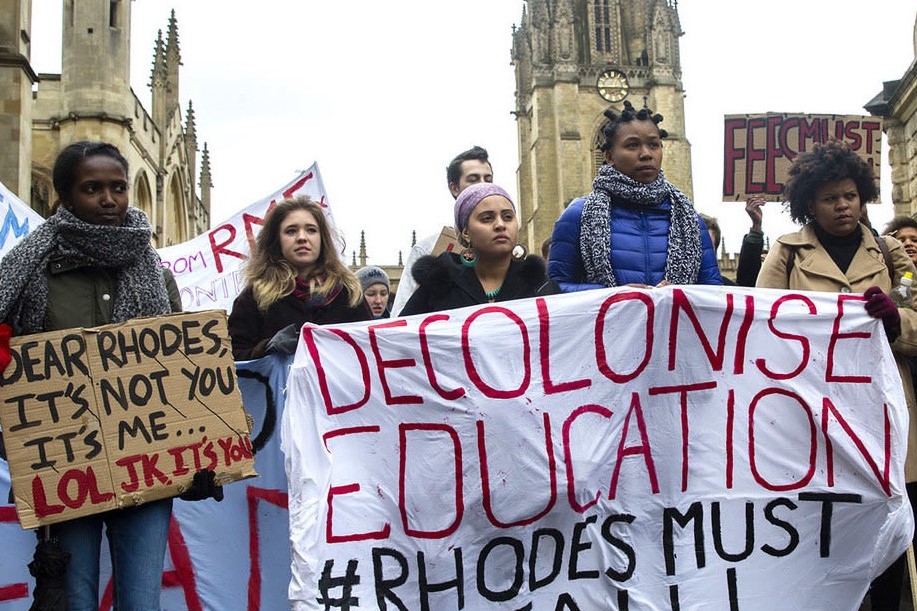Kitty Walsh, BA History and World Philosophies
“Ideological propaganda”. Apparently, that’s all the movement to decolonize the curriculum really amounts to, or so says journalist Melanie Phillips in her column for The Times. That or “Marxist gibberish”, that is itself “sinister and wrong”. But on what basis exactly? Well, on a recent episode of BBC Radio 4’s Moral Maze, she and panel members debated the issue with academics with some surprising and, to put it lightly, less than convincing arguments.
Dr. Priyamvada Gopal of the University of Cambridge, who has been outspoken in her support of the movement, revealed on Twitter that she was invited to speak on the show, but “decided against legitimizing its dodgy format and tenor with my presence”. With an all-white panel ranging from “soft centrists to rabid racists/xenophobes”, she argues, the show could hardly be trusted to facilitate a balanced debate. Always controversial, the programme really outdid itself this time. Here’s where they clashed:
Firstly, learning history through the prism of race (or gender) is reductive. Using the Enlightenment as an example, detractors claim that the movement does not do justice to seminal events and historical figures. But surely a curriculum that gives a selective, overly-simplistic account of history that leaves so much out is, as Professor Kehinde Andrews put it on the show, “narrow, limited and leads to a bucketload of ignorance”. Well said.
Learning is enriched, not impoverished, when we acknowledge the global context of historical events and have the tools to respond to them critically.
Secondly, it’s wrong to change the curriculum because to do so would be to judge the past by the values of the present. The decision to include aspects of history that, while true, are nevertheless disagreeable by today’s standards is not to moralize history but rather to widen its scope. These things really did happen. It is this same attitude that sparked public outrage when shadow chancellor, John McDonnell called Winston Churchill a villain and not a hero. The GOV.UK entry for Churchill is a case in point, crediting him as “an inspirational statesman, writer, orator and leader who led Britain to victory in the Second World War”, while saying nothing about his racist and white supremacist views on Islam, Judaism and pretty much anyone who wasn’t white. His opinions were not hidden. In fact, he was all too willing to express them. By all means, teach about his role in WWII, but include the bits that modern audiences find uncomfortable. By not doing so, we’re pandering to those who want to censor the past. Hypocrisy at its best.
Lastly, curriculums should not replace great Western thinkers with others just because they’re white men. This argument was a particular favourite of author Dr. Joanna Williams, who fears that the move to change syllabuses would necessarily lead to a “tickbox curriculum”. Changes, she maintains, should be made on the basis of intellectual merit, not skin colour, sexuality or gender. Well if that’s the case, let’s make those changes — they certainly deserve a place on the curriculum. Her continued resistance implies that the non-white, non-male and non-European literature that they seek to implement is inferior, and that any revision is nothing more than an expression of PC tokenism. Absurdity aside, it’s also alarmist. No-one’s arguing for the ousting of Plato or Shakespeare, but only for the curriculum to be both more critical and intellectually rigorous.
In all honesty, I’m not even sure if the episode merits comment. Gopal’s suspicions were confirmed when Melanie Phillips felt confident enough, after Dr. Andrews had pointed out that black people have historically suffered oppression at the hands of white people, that “isn’t it also the case that black people have oppressed black people?” She goes on: “you see the power relations in colonialism as being entirely white-on-black. I’m suggesting to you that that’s a very narrow way of interpreting history, that we are all capable of oppressing others”. Gopal was right – this was a pitiful excuse for an intelligent, balanced debate.
Credits: (medium.com)
